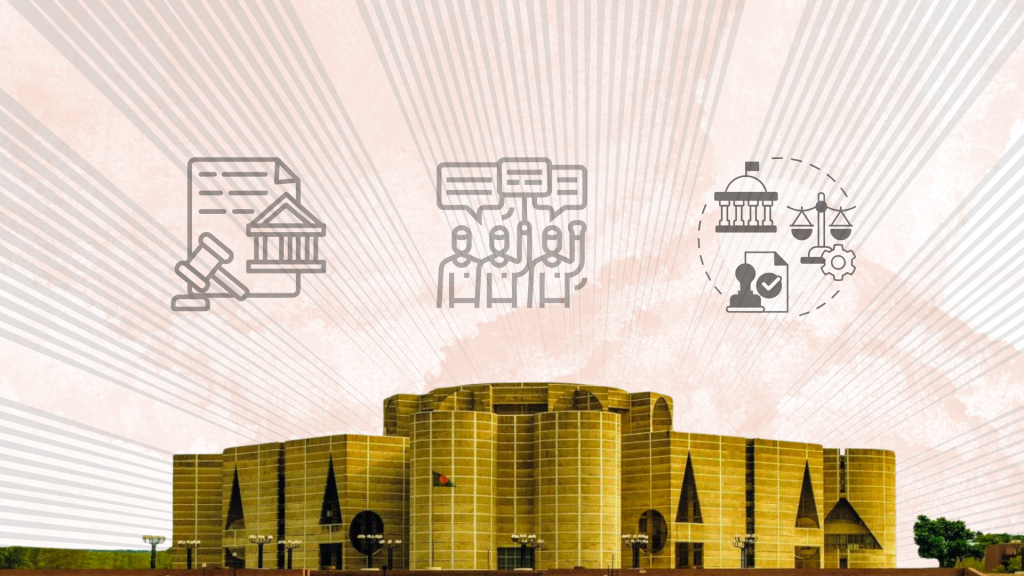“Reform” has become one of the most widely used terms in Bangladesh’s political landscape in the past year. Since the mass uprising, the call for shongskar has extended beyond the urban middle class and reached wider segments of society. Citizens increasingly recognize that institutional restructuring is necessary to cope with the changing political circumstances. In response, the government initially formed six reform commissions, later adding more to cover different agendas. Following their reports, a National Consensus Committee was tasked with facilitating dialogue across the political spectrum. The committee concluded its work on 8 October 2025. While the concrete outcomes of these discussions remain uncertain, the process itself captured public attention and highlighted the significance of inclusive debate.
The next stage, however, must focus on the quality of deliberation in Parliament, particularly as the country prepares for national elections in February 2025. The crucial question is whether Parliament can move beyond being a forum for political bargaining and instead function as a genuine legislative body.
Parliament as Lawmaking Institution: An Unfulfilled Promise
Although the Constitution of Bangladesh clearly states that Parliament’s foremost duty is lawmaking, in practice this function has been consistently overshadowed. Over the years, Parliament has increasingly become a venue for securing development projects and negotiating allocations for constituencies. Members of Parliament (MPs) are thus perceived less as legislators and more as patrons of local infrastructure. The very idea of “legislator” has almost disappeared from the public imagination.
This perception problem is not trivial. If both citizens and MPs themselves view their role primarily as bringing roads, bridges, and culverts to constituencies, the deliberative and lawmaking essence of Parliament is weakened. Local government institutions already exist to manage these responsibilities. When MPs act as “super chairmen or mayors,” they not only undermine decentralization but also divert attention from the pressing need for quality legislation.
Overreliance on Ordinances and Executive Drafts
The weakness of parliamentary lawmaking becomes visible in another practice: the frequent use of presidential ordinances. Ideally, ordinances are emergency instruments to be used when Parliament is not in session. Yet in Bangladesh, they have become a routine substitute for parliamentary debate. Laws are often first promulgated as ordinances and later formally approved by Parliament with minimal discussion.
This problem is compounded by the way parliamentary time is used. Instead of prioritizing legislation, a considerable share of sessions is spent on ritualistic or symbolic practices. For example, the President’s address at the beginning of each year prompts a Motion of Thanks debate, which should ideally be an opportunity for MPs to critically examine government policy. In reality, it is often dominated by lengthy speeches praising the government, leaving little room for substantive analysis. Similarly, the question–answer sessions, designed as a core accountability tool, frequently lose effectiveness because many questions are answered only in writing, with limited follow-up or serious ministerial scrutiny. Together, these practices consume valuable parliamentary time without significantly advancing lawmaking or oversight.
Transparency International Bangladesh (TIB) and Parliament Watch reports have repeatedly shown that less than 10 percent of parliamentary time is allocated for legislative discussions. When routine speeches and ceremonial debates occupy a disproportionate share, genuine lawmaking becomes marginal, weakening the very essence of parliamentary democracy.
Knowledge Deficit and Bureaucratic Dominance
Another critical challenge is the knowledge gap among MPs on specialized policy issues. Modern legislation requires detailed understanding of areas ranging from digital economy and financial regulation to climate governance. Most Bangladeshi MPs lack access to expert research assistance or independent parliamentary think tanks. Consequently, they are forced to rely heavily on bureaucrats when drafting or revising laws.
The result is executive dominance in legislation. Draft bills are usually prepared by ministries and merely tabled in Parliament for symbolic approval. Standing Committees, which should ideally scrutinize and amend bills, are weak and often partisan. TIB data shows that only around 8 percent of MPs in the last Parliament gave formal notices for discussion on bills. Instead of rigorous debates and amendments, the process becomes one of “rubber-stamping” bureaucratic drafts.
This overdependence undermines democratic accountability. Bureaucrats, unlike elected representatives, are not directly answerable to citizens. If laws continue to be shaped primarily by the executive, Parliament risks losing its relevance as the central lawmaking institution.
Development-Agent Syndrome: Misplaced Expectations The citizen perception that MPs are development agents exacerbates this crisis. Voters frequently measure an MP’s effectiveness by how many projects—roads, bridges, schools, mosques—they can deliver, rather than by the quality of debates or laws they contribute to. Many MPs embrace this role because it ensures visibility and political survival. But this blurs the distinction between local government and national legislature.
Research by parliamentary scholars like Dr. Nizam Ahmed has highlighted this constituency-service orientation as a defining characteristic of Bangladeshi MPs. While constituency engagement is important, reducing MPs to mere intermediaries for development projects sidelines their constitutional role as lawmakers and national policy shapers.
Towards Genuine Parliamentarians
If the call for reform is to be truly meaningful, it must begin with Parliament itself. Parliament can no longer function merely as a venue for seeking infrastructure budgets; it must reclaim its vital role in shaping a system of quality governance. The cornerstone of this transformation is not more members of Parliament, but parliamentarians of substance—individuals who understand that their foremost duty is to craft laws, hold the executive accountable, and contribute to constructive national debate. Only then can reform become a discussion worthy of serious attention.
Mahtab Uddin Chowdhury,an independent writer who primarily focuses on elections and parliament, local government, political economy, and climate governance


